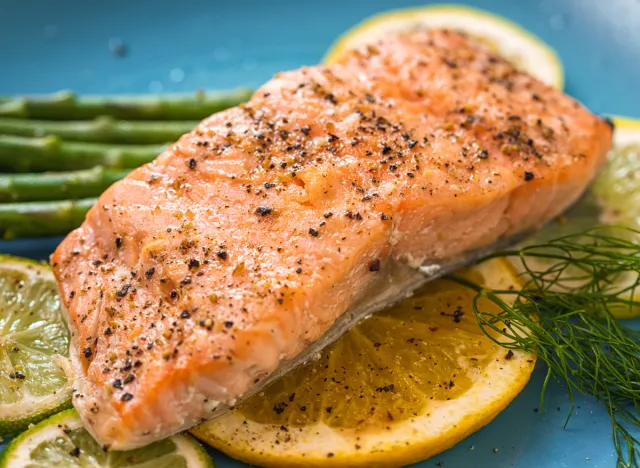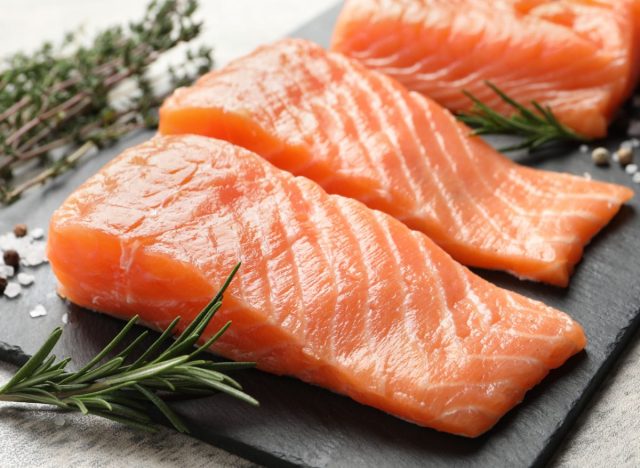Whether it's salmon, cod, mackerel, or tuna, eating more fish has many health benefits. For example, a 2021 meta-review found that increased fish consumption is linked to improved cardiovascular health and a lower risk of death. Chock full of protein, vitamins, and minerals, adding fish to your diet is a no-brainer if you're looking to boost the nutritional value of your dinner. Plus, they're low in calories, carb-free, and high in omega-3 polyunsaturated fatty acids (PUFAs), which are associated with brain function and heart health. It's no surprise that Americans are the second biggest fish consumers worldwide, according to the National Oceanic and Atmospheric Administration.
But beyond the health benefits, there are some other surprising benefits to incorporating more fish into your diet. To learn more, we chatted with Destini Moody, RDN, CSSD, LD, a registered dietitian and sports dietitian with Garage Gym Reviews, who shares 11 benefits of eating more fish.
Fish is high in Omega-3s.

One of the standout features of fish is its rich omega-3 fatty acid content, particularly prevalent in fatty fish like salmon and mackerel. Omega-3s offer many health benefits, from supporting brain function to reducing inflammation. According to the National Institutes of Health, some fish are richer sources of omega-3s than others, such as salmon, mackerel, tuna, herring, and sardines.
"Omega-3 fatty acids are an essential nutrient the body cannot make on its own but have powerful benefits in fighting chronic inflammation and maintaining brain and heart health," Moody explains. "Recent research even suggests it has benefits for athletic performance. Fish is the most potent dietary source of omega-3 fatty acids, and all you need to do is eat one serving of fatty fish one to two times a week to meet recommendations."
It is low in calories.

With a relatively low-calorie content compared to other protein options, fish provide an excellent foundation for balanced and calorie-conscious meals. The leanest fish options include cod, flounder, and haddock. Per the USDA, a 3-ounce serving of cod provides 67 calories.
Moody tells us, "Three ounces of tilapia contains just 100 calories, compared to nearly 200 calories for 3 ounces of your standard steak. This makes white fish like tilapia a great addition to most diets, especially low-calorie diets for weight loss."
It is a good source of vitamin D.

Fatty fish options like salmon and tuna are natural sources of vitamin D, an essential nutrient for bone health, immune function, and overall well-being. "It may surprise most to know that there are not many dietary sources of vitamin D. Americans get most of our vitamin D from fortification, artificially added vitamins, or dairy products and orange juice, but half of the U.S. is still deficient. Salmon and herring have the highest vitamin D content of most fish, with one 4-ounce serving of salmon containing 100 percent of your daily recommended needs," says Moody.
Fish is high in protein.

Protein is an essential macronutrient that aids muscle growth and repair, increases satiety, and supports overall health. "The average 3-ounce serving of fish contains about 20 grams of protein," says Moody. "Fish tends to have more protein than other types of animal protein like beef and chicken because, except for salmon, most fish are low in fat."
It can help you manage hunger.

Since fish is an excellent lean protein source, it can satisfy hunger and stave off cravings by helping you feel satiated. Moody says, "Due to the protein content, fish can keep your hunger at bay. This is because protein is the most satiating macronutrient compared to carbs and fats. This means it can keep you fuller for longer, which can help with weight loss and preventing overeating."
It can support heart health.

Regular fish consumption has been linked to heart health benefits, thanks to its omega-3 fatty acids that help lower blood pressure, reduce triglycerides, and prevent irregular heartbeats.
"Researchers have found those who eat fish have the lowest risk of heart attacks and strokes, two of the most common causes of premature death in the world," says Moody. "Fish can replace protein sources high in saturated fat in your diet like beef and pork, which is much healthier for your heart."
It is a rich source of iodine.

Saltwater fish are excellent sources of iodine, a vital mineral for thyroid function and metabolic health. One study found that saltwater fish may contain five to ten times more iodine than freshwater fish. "Besides controlling your appetite and immune system, iodine plays an important role in thyroid function. However, there are very few dietary sources of iodine, as it's a mineral that's most rich in seawater. Fortunately, fish are a great way to consume this vital nutrient," says Moody.
It's a good option for those lowering their meat intake.

For those following a diet consisting primarily of plants with minimal animal protein, fish can be an excellent lean protein option to eat on occasion. "Some of the healthiest diets in the world include lots of fruits and vegetables, but with small amounts of lean animal protein," states Moody. "These are called plant-based diets and are so health-promoting because they allow for plenty of antioxidants from plants while also providing crucial nutrients we need from animal protein like iron and B12 without overconsuming animal products. This is where fish can fit in as it is lower in saturated fat than most other animal protein sources and adds to the nutritional benefits of plant-based diets."
Fish is highly versatile.

From grilling to poaching to tacos to salads, the versatility of fish in the kitchen makes it a culinary staple. "The beautiful thing about fish is that you can do a lot with it and incorporate it into many meals to prevent you from getting bored," says Moody. "Tilapia can be made into tacos, salmon can be flaked into pasta, and sardines can be added to a greens salad."
It is affordable.

Contrary to the common misconception that seafood is expensive, budget-friendly fish options do exist—and it doesn't mean sacrificing nutritional benefits.
Moody explains, "The hefty price tag on salmon and swordfish often discourages people from regularly eating fish. However, people should remember that fish is widely available in canned and frozen forms and contains the same wonderful nutrients and benefits as fresh fish. Canned tuna, mackerel, and salmon are affordable ways to add fish to your diet, but they last longer without going bad, reducing food waste and saving you even more cash."
It's easy to cook.

Whether grilled, baked, or pan-seared, fish can be a convenient addition to your weekly meal rotation. This is especially true for people with busy schedules who want to eat a nutritious lean protein source. "Most fish have a quick cooking time and can be baked, fried, seared, boiled, and even grilled," states Moody. "White fish especially has a very mild flavor, making it compatible with various seasonings to suit the palate of even the pickiest eaters."
No comments:
Post a Comment